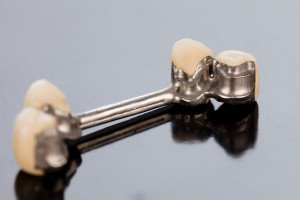Are Dental Crowns The Right Choice For You?
 Dental crowns are placed over a tooth in order to repair and restore a dental implant or natural tooth. Crowns are typically recommended when a tooth’s health is threatened by an excessively large cavity. During the procedure, dental cement is normally used in order to bond the crown to the damaged tooth. They are typically manufactured using a variety of materials that will enhance the appearance and improve the strength of the damaged tooth.
Dental crowns are placed over a tooth in order to repair and restore a dental implant or natural tooth. Crowns are typically recommended when a tooth’s health is threatened by an excessively large cavity. During the procedure, dental cement is normally used in order to bond the crown to the damaged tooth. They are typically manufactured using a variety of materials that will enhance the appearance and improve the strength of the damaged tooth.
When Are Dental Crowns Recommended?
There are a number of reasons why Community Dental Group will recommend undergoing a crown procedure. If any of the following reasons apply to your circumstances, you may be a candidate for this type of procedure:
- A cosmetic modification or restoration is required to restore the tooth.
- A dental bridge needs to be secured in place.
- A dental implant (screw) needs to be covered.
- The tooth has been cracked and needs to be held together or it has been weakened by decay and needs to be protected from breakage.
- The tooth is already broken or so worn down that restoration is the only option.
- There isn’t a lot of natural tooth left due to having a large filling so a crown is recommended to cover and support it.
Dental crowns may also be recommended to restore or save a child’s baby teeth based on a number of reasons. For instance, when decay has extensively damaged a tooth, a crown may be the only solution for saving it until the permanent tooth comes in. Additionally, If your child has not been practicing proper oral hygiene, a crown will protect the tooth from the elevated risk of decay.
Different Types Of Crowns To Choose From
At Community Dental Group we currently offer different types of dental crowns in order to accommodate our patient’s needs and preferences. For instance:
All ceramic or porcelain – provide a better, more natural looking match with the color of your existing teeth while at the same time being the recommended type for those individuals who have allergies to metals
All resin – these are a more cost-effective option but they are prone to fracturing and tend to wear down quicker than ceramic or porcelain options
Other metals – includes base metal alloys such as chromium or nickel and other types of alloys such as gold or palladium alloy
Stainless steel – commonly used as a temporary measure on permanent teeth
Permanent vs. temporary crowns – we can make you a permanent or temporary crown here in our laboratory or office